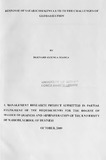| dc.description.abstract | Rapid globalization is one of the most salient aspects of the new millennium owing to the fast
development of Information Technology (IT) in the last two decades (Brown, 1999). To different
observers, different types of globalization can be identified even though most of the attention is
in the areas of economy, technology, and culture (Brown and Lauder, 1996). According to Cheng
(2000), there should be multiple globalizations, including technological globalization, economic
globalization, social globalization, political globalization, cultural globalization, and learning
globalization in the new millennium. However, globalization has brought with it challenges that
have made local firms in Kenya to devise means of staying competitive not only in the global
market but also in the local market. Local firms have been forced to diversify their product
portfolio to cope with competition, maintain market share, enter into new markets and seal off
any unexplored market segments that foreign competitors may come to exploit. The purpose and
objective of this study is to determine the responses used by Safaricom Limited to curb the
challenges of globalization.
This was a case study research on a population of Safaricom Ltd's employees from which a
sample size of 8 was chosen from the heads of departments. Interview guides as primary data
collection instruments were used and the qualitative data obtained was analyzed using in-depth
content analysis.
The study concludes that Safaricom has responded to challenges of globalization by recruiting
and retaining innovative and creative staff members, differentiating its products and services,
engaging in intensive marketing, forming strategic alliance and acquisition with companies in the
telecommunication industry. The study recommends that Safaricom should engage in cost
reduction like its competitors and diversify into other countries both within and without East African region. | en |

